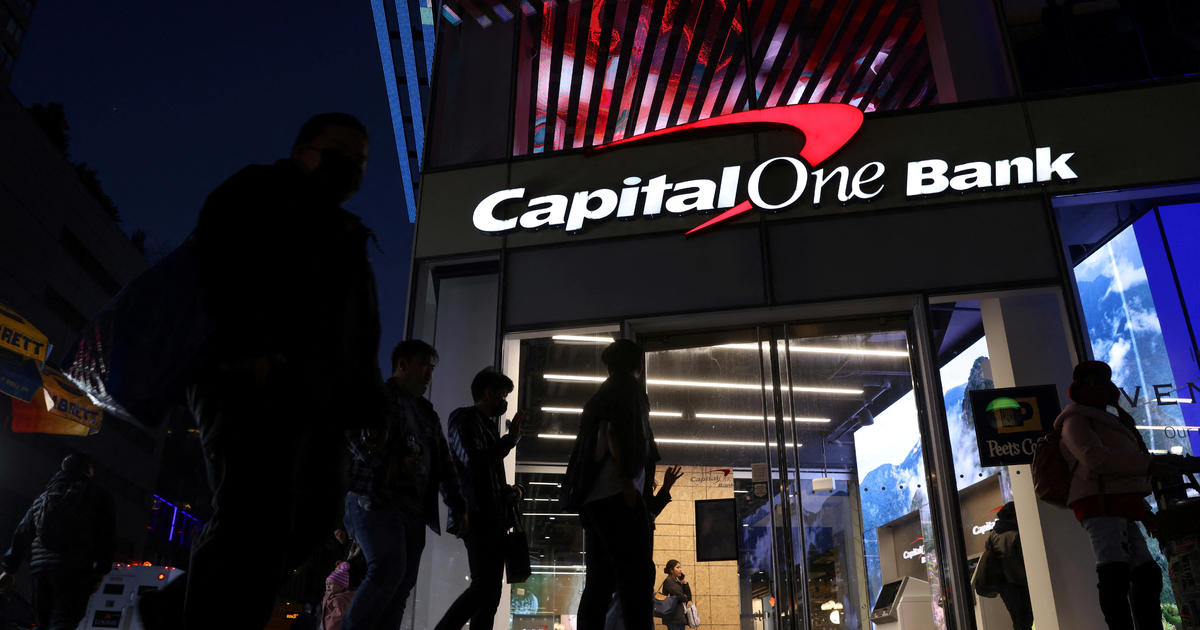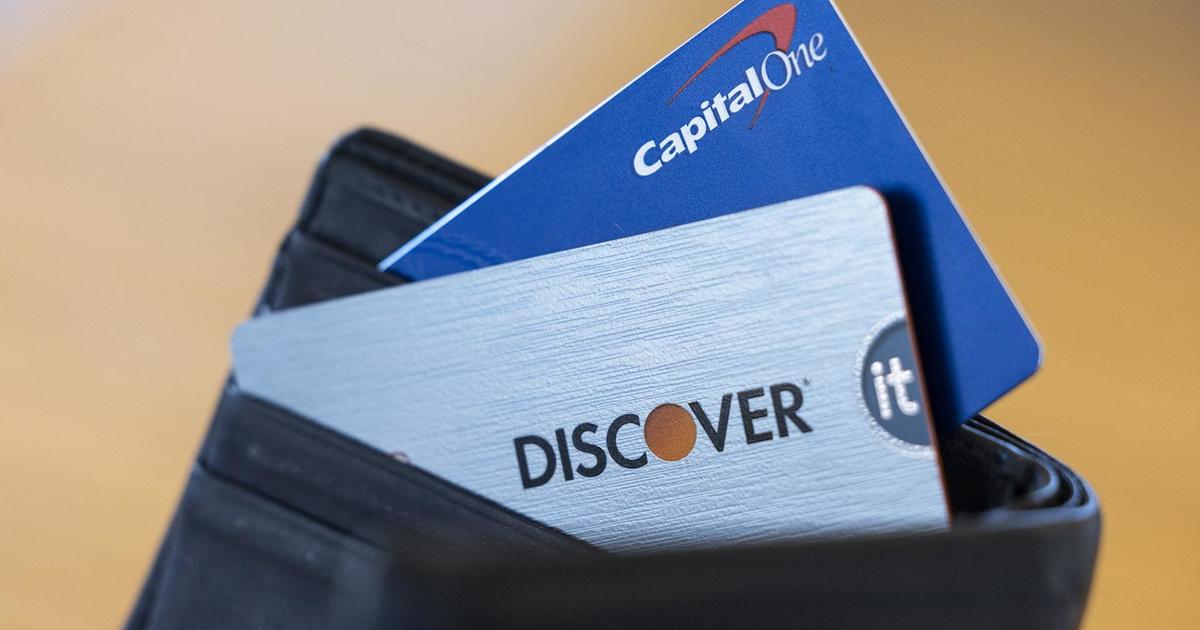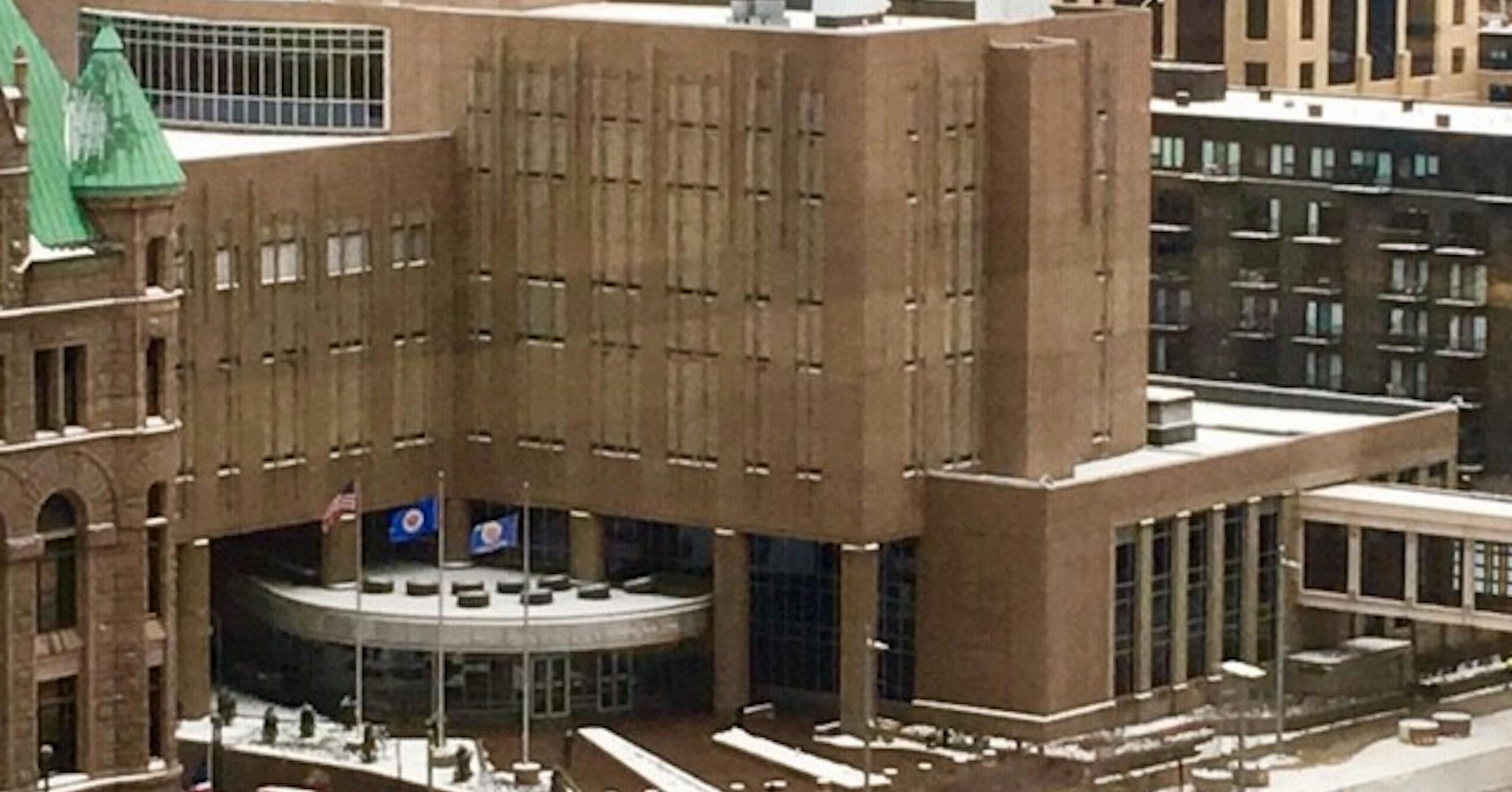CBS News
Capital One says it’s buying Discover for $35 billion, creating credit card and payments giant

New York — Capital One Financial said it will buy Discover Financial Services for $35 billion, a deal that would bring together two of the nation’s major credit card companies as well as potentially shake up the payments industry, which is largely dominated by Visa and Mastercard.
Under the terms of the all-stock transaction, Discover Financial shareholders will receive Capital One shares valued at nearly $140. That’s a significant premium on the $110.49 that Discover shares closed at Friday. Capital One said the deal is expected to close late this year or early next.
The deal marries two of the largest credit card companies that aren’t banks first, like JPMorgan Chase and Citigroup, with the notable exception of American Express. It also brings together two companies whose customers are largely similar — often Americans who are looking for cash back or modest travel rewards, compared to the premium credit cards dominated by AmEx, Citi and Chase.
“This marketplace that’s dominated by the big players is going to shrink a little bit more now,” said Matt Schulz, chief credit card analyst at LendingTree.
It also will give Discover’s payment network a major credit card partner in a way that could make the payment network a major competitor once again. The U.S. credit card industry is dominated by the Visa-Mastercard duopoly with AmEx being a distance third and Discover an even more distant fourth. It’s unclear whether Capitol One will adopt the Discover payment system or set up a payment network that allows parallel use of Discover and a second payment network like Visa.
“Our acquisition of Discover is a singular opportunity to bring together two very successful companies with complementary capabilities and franchises, and to build a payments network that can compete with the largest payments networks and payments companies,” said Richard Fairbank, the chairman and CEO of Capital One, in a statement.
It’s unclear whether the deal will pass regulatory scrutiny. Nearly every bank issues a credit card to customers but few companies are credit card companies first, and banks second. Both Discover – which was long ago the Sears Card – and Capital One started off as credit card companies that expanded into other financial offerings like checking and savings accounts.
Consumer groups are expected to put heavy pressure on the Biden Administration to make sure the deal is good for consumers as well as shareholders.
“The deal also poses massive anti-trust concerns, given the vertical integration of Capital One’s credit card lending with Discover’s credit card network,” said Jesse Van Tol, president and CEO of the National Community Reinvestment Coalition.
With its purchase of Discover, Capital One is betting that Americans’ will continue to increasingly use their credit cards and keep balances on those accounts to collect interest. In the fourth quarter of 2023, Americans held $1.13 trillion on their credit cards, and aggregate household debt balances increased by $212 billion, up 1.2%, according to the latest data from the New York Federal Reserve.
As they run up their card balances, consumers are also paying higher interest rates. The average interest rate on a bank credit card is roughly 21.5%, the highest it’s been since the Federal Reserve started tracking the data in 1994.
Capital One has long has a business model looking for customers who will keep a balance on their cards, aiming for customers with lower credit scores than American Express or even Discover.
At the same time, the two lenders have had to boost their reserves against the possibility of rising borrower defaults. After battling inflation for more than two years, many lower- and middle-income Americans have run through their savings and are increasingly running up their credit card balances and taking on personal loans.
The additional reserves have weighed on both banks’ profits. Last year, Capital One’s net income available to common shareholders slumped 35% versus 2022, as its provisions for loan losses soared 78% to $10.4 billion. Discover’s full-year profit sank 33.6% versus its 2022 results as its provisions for credit losses more than doubled to $6.02 billion.
Discover’s customers are carrying $102 billion in balances on their credit cards, up 13% from a year earlier. Meanwhile, the charge-off rates and 30-day delinquency rates have climbed.
Beyond boosting bank deposits and loan accounts, the acquisition would give Capital One access to the Discover payment processing network. While smaller than industry giants Visa and Mastercard, the Discover network will enable Capital One to get revenue from fees charged for every merchant transaction that runs on the network.
Discover has been operating under heightened scrutiny from regulators. Last summer, the company disclosed that beginning around mid-2007, it incorrectly classified certain card accounts into its highest merchant pricing tiers. The company also received an unrelated consent order from the Federal Deposit Insurance Corporation over its customer compliance management.
Analysts at Citigroup say the regulatory issues may have prompted the sale.
“We are surprised that DFS would sell, but suppose that its regulatory challenges such as its recent October FDIC consent order and the card product misclassification issue may have opened the door for the board to consider strategic alternatives that it may not have in the past,” wrote analysts Arren Cyganovich and Kaili Wang in a note to clients.
CBS News
Future of government spending deal unclear after Trump opposition

Watch CBS News
Be the first to know
Get browser notifications for breaking news, live events, and exclusive reporting.
CBS News
Stock market plummets after Fed forecasts fewer rate cuts in 2025

U.S. stocks plummeted in one of their worst days of the year after the Federal Reserve forecast Wednesday it may deliver fewer shots of adrenaline for the economy in 2025 than it had earlier projected.
The S&P 500 fell 178 points, or 3%, pulling it further from its all-time high set a couple weeks ago. The Dow Jones Industrial Average lost 1,123 points, or 2.6%, while the Nasdaq composite dropped 3.6%.
The Fed said Wednesday it’s cutting its benchmark interest rate for a third time this year, continuing the sharp turnaround begun in September when it started lowering rates from a two-decade high to support the job market. Wall Street loves lower interest rates, but the Dec. 18 cut had been widely expected by Wall Street.
Why is the stock market down today?
Investors were unsettled by the Fed’s forecast for fewer cuts in 2025, even though many economists had already been paring their expectations given sticky inflation.
“Markets have a really bad of habit of overreacting to Fed policy moves,” Jamie Cox, managing partner for Harris Financial Group, said in an analyst note. “The Fed didn’t do or say anything that deviated from what the market expected—this seems more like, I’m leaving for Christmas break, so I’ll sell and start up next year.”
The bigger question centers on how much more the Fed could cut next year. A lot is riding on it, particularly after expectations for a series of cuts in 2025 helped the U.S. stock market set an all-time high 57 times so far in 2024.
Fed officials released projections on Wednesday showing the median expectation among them is for two more cuts to the federal funds rate in 2025, or half a percentage point’s worth. That’s down from the four cuts they had expected just three months ago.
“We are in a new phase of the process,” Fed Chair Jerome Powell said. The central bank has already quickly eased its main interest rate by a full percentage point, to a range of 4.25% to 4.50%, since September.
What happened to the stock market today?
Asked why Fed officials are looking to slow their pace of cuts, Powell pointed to how the job market looks to be performing well overall and how recent inflation readings have picked up. He also cited uncertainties that will require policy makers to react to upcoming, to-be-determined changes in the economy.
While lower rates can goose the economy by making it cheaper to borrow and boosting prices for investments, they can also offer more fuel for inflation.
Powell said some Fed officials, but not all, are also already trying to incorporate uncertainties inherent in a new administration coming into the White House. Worries are rising on Wall Street that President-elect Donald Trump’s preference for tariffs and other policies could further juice inflation, along with economic growth.
“When the path is uncertain, you go a little slower,” Powell said. It’s “not unlike driving on a foggy night or walking into a dark room full of furniture. You just slow down.”
One official, Cleveland Fed President Beth Hammack, thought the central bank should not have even cut rates this time around. She was the lone vote against Wednesday’s rate cut.
Wall Street’s worst performers
The reduced expectations for 2025 rate cuts sent Treasury yields rising in the bond market, squeezing the stock market.
The yield on the 10-year Treasury rose to 4.51% from 4.40% late Tuesday, which is a notable move for the bond market. The two-year yield, which more closely tracks expectations for Fed action, climbed to 4.35% from 4.25%.
On Wall Street, stocks of companies that can feel the most pressure from higher interest rates fell to some of the worst losses.
Stocks of smaller companies did particularly poorly, for example. Many need to borrow to fuel their growth, meaning they can feel more pain when having to pay higher interest rates for loans. The Russell 2000 index of small-cap stocks tumbled 4.4%.
Elsewhere on Wall Street, General Mills dropped 3.1% despite reporting a stronger profit for the latest quarter than expected. The maker of Progresso soups and Cheerios said it will increase its investments in brands to help them grow, which pushed it to cut its forecast for profit this fiscal year.
Nvidia, the superstar stock responsible for a chunk of Wall Street’s rally to records in recent years, fell 1.1% to extend its weekslong funk. It has dropped more than 13% from its record set last month and fallen in nine of the last 10 days as its big momentum slows.
“As we wrote in our 2025 outlook a couple of weeks ago, stretched positioning and sentiment left stocks vulnerable to a sell-off,” Jeff Buchbinder, chief equity strategist for LPL Financial said in a note about today’s market sell-off. “The big jump in inflation expectations and related bond sell-off was a convenient excuse. Once support from tech evaporated, no other groups were able to step in to fill that gaping hole.”
CBS News
Trump comes out against Johnson bill that would avert shutdown

Watch CBS News
Be the first to know
Get browser notifications for breaking news, live events, and exclusive reporting.






